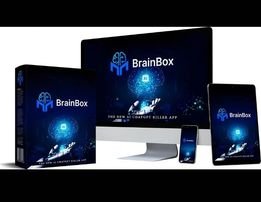BrainBox - The New AI ChatGPT Killer App

As an AI language model, I can provide a review of the concept of a "first to market hard-coded AI app" that enables individuals to launch their own AI chatbot similar to ChatGPT and monetize it.
The idea of a chatbot app that allows individuals to create their own AI chatbot is not a new concept. Many existing platforms already offer such services, and it can be challenging for a new entrant to differentiate themselves in a crowded market. However, the notion of a hard-coded AI app may offer certain advantages in terms of customization and control.
On the positive side, a hard-coded AI app can potentially provide users with more flexibility to customize their chatbot to suit their particular use case or audience. This could be particularly useful for businesses looking to create a chatbot that integrates with their existing workflows and systems. Moreover, the ability to charge for the use of the chatbot could be a significant selling point for entrepreneurs and businesses looking to monetize their services.
However, there are also potential drawbacks to this type of app. For example, hard-coding an AI app may limit its scalability, as it would be challenging to add new features or functionalities. Additionally, hard-coding an AI app may require significant technical expertise, which could limit its appeal to a broader audience. There may also be issues around data privacy and security, particularly if sensitive data is being processed or stored.
Overall, the concept of a first-to-market hard-coded AI app that allows individuals to create and monetize their own chatbot is an intriguing one. However, its success will depend on how well it can differentiate itself from existing platforms, and how well it addresses the potential limitations and concerns of users.
To expand on the potential advantages of a hard-coded AI app, it may provide users with greater control and ownership over their chatbot's functionality and data. With a hard-coded app, users can modify the code directly, rather than relying on pre-built templates or interfaces. This level of control could be particularly useful for businesses with specific requirements or workflows that need to be integrated into their chatbot.
Moreover, a hard-coded AI app may provide greater performance and speed compared to cloud-based chatbot solutions, as it is not dependent on internet connectivity or server response times. This could result in a smoother and more seamless experience for users interacting with the chatbot.
However, there are also potential drawbacks to a hard-coded AI app. For instance, the technical expertise required to build and maintain a hard-coded chatbot may limit its appeal to a broader audience. This could be particularly true for small businesses or entrepreneurs who may not have the necessary technical skills or resources.
Another challenge with a hard-coded app is that it may be challenging to add new features or scale the chatbot as the user base grows. This could limit the chatbot's ability to evolve and adapt to changing user needs and expectations.
Finally, data privacy and security are critical concerns when it comes to AI chatbots. With a hard-coded app, users would be responsible for ensuring that their chatbot complies with data privacy regulations and that their users' data is stored securely.
In summary, a hard-coded AI app that lets users launch their own ChatGPT-like chatbot and monetize it has both potential benefits and drawbacks. Its success will depend on how well it addresses the needs of its target audience, and how well it can differentiate itself from existing solutions in the market.
Click here >>>http://bitly.ws/Btvy